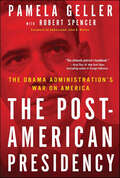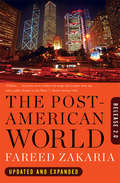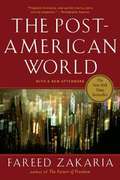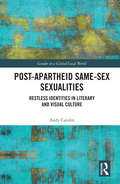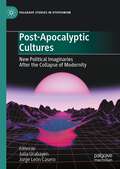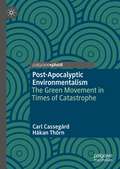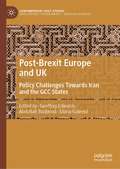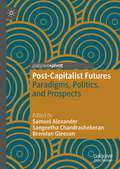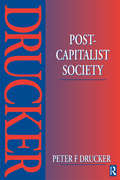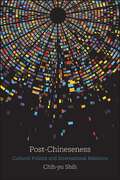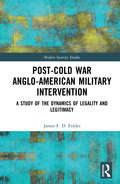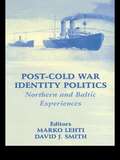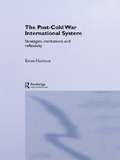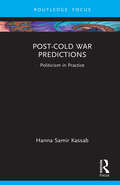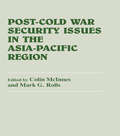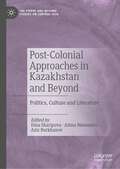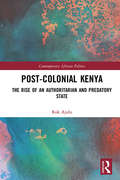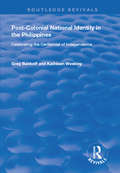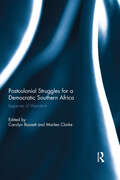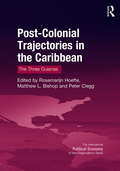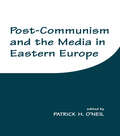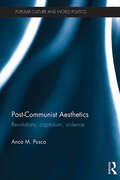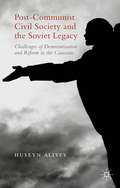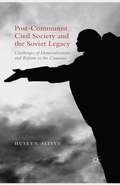- Table View
- List View
The Post-American Presidency: The Obama Administration's War on America
by Pamela Geller Robert SpencerPopular conservative blogger Pamela Geller and New York Times bestselling author Robert Spencer sound a wake-up call for Americans to stop the Obama administration from limiting our hard-won freedoms, silencing our democratic voices, and irreparably harming America for generations to come. America is being tested in a way that she has never been tested before. Since taking the oath of office in January 2009, President Barack Obama has cheered our enemies and demoralized our allies. He is hard at work "remaking" America by destroying the free-market system and nationalizing major segments of our economy, demonizing dissent and restricting freedom of speech, turning against our longtime friends, and above all, subjecting us to the determinations of foreign authorities. In this timely and urgent battle cry, Pamela Geller, founder of the widely popular website www.AtlasShrugs.com, and New York Times bestselling author Robert Spencer team up to expose the Obama administration’s destructive agenda—largely ignored by the mainstream media—and rally Americans to protect the sovereignty of a country that is under siege by the highest levels of its own government. As Americans see their paychecks shrinking every day, Obama ignores our forefathers’ founding principle: individual rights. Instead, he seeks to level the playing field—to transform both the global and national landscape in favor of our enemies—even if it means cutting America off at the knees. He envisions himself as more than just a president of the United States, but as a shaper of the new world order, an internationalist energetically laying the groundwork for global government: the president of the world. A vital guide to helping conservatives prepare for the tough battles ahead, The Post-American Presidency critically examines the Obama administration’s ominous and revealing moves against our basic freedoms, particularly as he seizes control of the three engines of the American economy: health care, energy, and education. The Shining City on a Hill has gone dark. But America is not dead. The time is NOW to stand up and fight.
The Post-American World: Release 2.0 (International Edition)
by Fareed Zakaria"A relentlessly intelligent book." --Joseph Joffe, New York Times Book Review "This is not a book about the decline of America, but rather about the rise of everyone else." So begins Fareed Zakaria's blockbuster on the United States in the twenty-first century, and the trends he identifies have proceeded faster than anyone anticipated. How might the nation continue to thrive in a truly global era? In this fully updated 2.0 edition, Zakaria answers these questions with his customary lucidity, insight, and imagination.
The Post-American World
by Fareed ZakariaZakaria (Time magazine editor-at-large and host of CNN's "Fareed Zakaria GPS") updates his discussion of the relative decline of American global power in order to take into account the impact of the economic crisis of the late 2000s and other recent developments, which have only accelerated the transition to the "post-American" world and the rise of new powers in Zakaria's estimation. It must be stressed that Zakaria is only predicting a relative decline in power for the United States and that he believes that the United States can maintain a healthy position in the world by more carefully balancing foreign policy priorities, pushing for broad international rules conducive to long-term US interests instead of pushing for narrow and short-term interests, seeking better relations with rising powers instead of seeking to balance against them, encouraging ad hoc multilateral approaches to global problems in lieu of the lost hegemonic order, recognizing the dangers of opponents' asymmetric power in order to avoid getting sucked into traps, and recognizing international legitimacy as a key element of national power.
Post-Apartheid Same-Sex Sexualities: Restless Identities in Literary and Visual Culture (Gender in a Global/Local World)
by Andy CarolinThis book examines how same-sex sexualities are represented in several post-apartheid South African cultural texts, drawing on a rich local archive of same-sex sexualities that includes recent fiction, drama, film, photography, and popular print culture. While the book situates these texts within the specific context of post-apartheid South Africa, it also looks outwards towards transnational connectivity and cultural flows. The author uses the idea of restlessness to refer to the uneven flow of cultural tropes, political sentiment, ideas, ideologies, and representational modes across geographical boundaries, across time and space, and between genres, presenting sexual cultures as simultaneously rooted and transnational. He focuses on how notions of race and gender, in the shadow of colonialism and apartheid, play out in the present and shape how sexualities are represented. This interdisciplinary book offers a conceptual entry point to several areas of study, including transnationalism, literary and cultural studies, critical race theory, gender and sexuality studies, and African studies, and will be of interest to students and researchers across these fields. Its inclusion of a range of textual genres extends its reach into visual culture, film and media studies, history, and politics.
Post-Apocalyptic Cultures: New Political Imaginaries After the Collapse of Modernity (Palgrave Studies in Utopianism)
by Julia Urabayen Jorge León CaseroThis book advocates for the necessity of recovering the value of utopias as political projects that open new channels of action. The criticism of modern political utopias is based on the supposed impossibility of creating for the future because there is no longer a future (apocalyptic ideology). However, this edited collection seeks to show that the post-apocalyptic world in which we live entails a renewed freedom of design for the radical reorganization of institutions. Post-apocalyptic cultures are not obligated to follow the capitalist, anthropocentric, correlationist and sovereign modes of the old political project of emancipation—the Western enlightenment—that has started to collapse. With this in mind, this book is divided into four sections dedicated to the main themes from which to rethink the projects of political emancipation that are possible nowadays: technopolitics; posthumanist biopolitics; non-western politicsl and the crossover between arts and politics.
Post-Apocalyptic Environmentalism: The Green Movement in Times of Catastrophe
by Carl Cassegård Håkan ThörnThis book analyses how the environmental movement has developed three overarching narratives that co-exist and compete within it. The first is the narrative of green progress, which has been prominent from the start in environmentalist thought and which is today expressed in the idea of sustainable development and in eco-modernism. The second is the apocalyptic narrative, which urges us to act in order to avert a future catastrophe and which rose to prominence with Rachel Carson and other classics of post-war environmentalism and experienced a renaissance with the climate activism of the 2000s. The third is the postapocalyptic narrative according to which catastrophe is already an unavoidable fact. The centrepiece of the book is its discussion of the postapocalyptic narrative, which has become influential in the recent decade, especially in the wake of the disillusionment following the failed climate summit in Copenhagen 2009. Climate change, resource exhaustion, pollution and species extinction signal that catastrophes have already become realities here and now for an enormous number of people and other lifeforms. The book probes the possibilities and limitations of the environmental movement in grappling with these issues and turning them into relevant action.
Post-Brexit Europe and UK: Policy Challenges Towards Iran and the GCC States (Contemporary Gulf Studies)
by Geoffrey Edwards Abdullah Baabood Diana GaleevaThis book discusses how tensions and unknowns may impact future relations between a post-Brexit UK, the EU and the countries of the Gulf, including Iran. The authors of this book consider, in different ways, whether British and EU27 relations with the Gulf States may change or whether the traditions and the weight of their history reinforce the pre-existing patterns of these relationships. Ongoing changes in the Gulf, the present disputes and the trajectories economic reform also influence these discussions. The book analyses the changing positions of the US, China and Russia that are likely to impact Europe’s interests. It explores outcomes of ongoing world challenges, such as the COVID-19 pandemic and the crash of oil prices, to further examine Post-Brexit Europe and UK policy challenges towards Iran and the GCC States.
Post-Capitalist Futures: Paradigms, Politics, and Prospects (Alternatives and Futures: Cultures, Practices, Activism and Utopias)
by Samuel Alexander Sangeetha Chandrashekeran Brendan GleesonAs the crises of capitalism continue to intensify, radical thinkers must conjure realistic and inspirational alternative futures beyond this failing social order. This book presents a stimulating array of essays exploring such post-capitalist futures. With contributions and perspectives from the Global North and Global South, central topics include ecosocialism, ecofeminism, degrowth, community economies, and the Green New Deal. There are also chapters offering analyses of land, energy, technology, universal basic services, and (re)localisation of economies. The book is in three parts. The first presents various alternative paradigms for thinking about – and working toward – post-capitalist futures. The second section offers perspectives on alternative governance strategies and approaches for post-capitalist futures. The closing section gathers various analyses of post-capitalist geographies and resistance. Going beyond critique and instead envisioning alternative imaginaries, this collection should challenge and inspire readers to think and act upon the range of possibilities immanent in our crisis-ridden present.
Post-Capitalist Society
by Peter DruckerWe are in the middle of another time of radical economic change, from the Age of Capitalism and the Nation-State, to a Knowledge Society.
Post-Capitalist Society
by Peter Drucker"The basic economic resource - 'the means of production', to use the economist's term - is no longer capital, nor natural resources, nor 'labour'. it is an will be knowledge."With penetrating insight Peter Drucker describes the changes that are affecting politics, business and society itself. It is vital that we are aware of and understand these changes in order to benefit from the opportunities that the future has to offer.
Post-Chineseness: Cultural Politics and International Relations (SUNY series, James N. Rosenau series in Global Politics)
by Chih-yu ShihThere have been few efforts to overcome the binary of China versus the West. The recent global political environment, with a deepening confrontation between China and the West, strengthens this binary image. Post-Chineseness boldly challenges the essentialized notion of Chineseness in existing scholarship through the revelation of the multiplicity and complexity of the uses of Chineseness by strategically conceived insiders, outsiders, and those in-between. Combining the fields of international relations, cultural politics, and intellectual history, Chih-yu Shih investigates how the global audience perceives (and essentializes) Chineseness. Shih engages with major Chinese international relations theories, investigates the works of sinologists in Hong Kong, Singapore, Pakistan, Taiwan, Vietnam, and other academics in East Asia, and explores individual scholars' life stories and academic careers to delineate how Chineseness is constantly negotiated and reproduced. Shih's theory of the "balance of relationships" expands the concept of Chineseness and effectively challenges existing theories of realism, liberalism, and conventional constructivism in international relations. The highly original delineation of multiple layers and diverse dimensions of "Chineseness" opens an intellectual channel between the social sciences and humanities in China studies.
Post-Cold War Anglo-American Military Intervention: A Study of the Dynamics of Legality and Legitimacy (Modern Security Studies)
by James F. FiddesExploring case studies from the first Gulf War to the Syria crisis, this book discusses different approaches to the use of international law and the role it plays in international power politics. Analysis of the post-Cold War overseas military involvements of Western powers has focused on their legality and legitimacy, allowing for a conflation of the concepts and distracting from the true source of international legitimacy. Demonstrating compliance with international law can be helpful, but it plays a secondary role to other, more powerful considerations such as national interest and shared national security concerns. Exploring the key drivers for decision-makers, this book identifies the impact of previous experience on the use of international law in the quest for legitimacy ahead of launching military action. Patterns in approach and of relations between close Western allies (in particular the UK and US) are identified, offering valuable lessons for future strategic decision-making. This book will appeal to scholars and students of International Relations and International Law. Think Tanks focussing on International Relations and the use of force and practitioners working in the realm of foreign policy with a focus on the UN and international law will also be interested in the study and conclusions drawn.
Post-Cold War Identity Politics: Northern and Baltic Experiences (Routledge Studies in Nationalism and Ethnicity)
by David J. Smith Marko LehtiDuring the past decade northern Europe has started to assume an identity of its own. Categories of East and West have become blurred, challenging as well the idea of what it means to be Nordic. Post-Cold War Identity Politics maps this process in Scandinavia. Looking at projects designed to help regional development in the Nordic countires, it assesses whether a new way of defining 'Northern-ness' is emerging. The book highlights the existence of co-existing and - to some extent - competing region-building projects in northern Europe. It demonstrates how they are all efforts by existing nations to redefine their role in Europe at a time of change, and points to how they might develop in the future.
The Post-Cold War International System: Strategies, Institutions and Reflexivity (New International Relations)
by Ewan HarrisonThe end of the Cold War has opened up a 'real world laboratory' in which to test and refine general theories of international relations. Using the frameworks provided by structural realism, institutionalism and liberalism, The Post-Cold War International System examines how major powers responded to the collapse of the Soviet Union and developed their foreign policies over the period of post-Cold War transition. The book argues that the democratic peace has begun to generate powerful socialisation effects, due to the emergence of a critical mass of liberal democratic states since the end of the Cold War. The trend this has produced is similar to a pattern that classical realists have interpreted as 'bandwagoning' within a unipolar power structure. Case studies of Germany, China and Japan - identified as key states with the potential to challenge US dominance - provide evidence to support the assessment of international change. The author concludes by exploring the implications of September 11th for the analysis developed. This important volume argues that the end of the Cold War was a major historical turning point in the development of world politics with fundamental implications for the basic way in which the dynamics of the international system are conceptualised.
Post-Cold War Predictions: Politicism in Practice (ISSN)
by Hanna Samir KassabPost- Cold War Predictions examines how the international order evolved after the collapse of the Soviet Union (and before the attacks on 9/11) by focusing on the ways we study and understand major powers’ security behavior within the evolving multipolar order. Beginning with an overview of Post-Cold War literature, Kassab summarizes and evaluates influential Post-Cold War texts to better understand scholarship’s need to predict. First, he discusses the central importance of power in international relations and drives home the central focus of international structures, linking findings to the broader structure-agent problem. He then reinterprets the purpose of theory, preferring explanatory theories to those that aim to predict outcomes. To understand the context by which political ideas were developed and followed as if they were political ideologies, Hanna Samir Kassab makes explicit the links between historicism and historiography, forwarding a new methodology for studying political science: Politicist analysis. Using simple jargon and defining terms where necessary, this succinct and enlightening text is required reading for all those interested in international politics.
Post-Cold War Security Issues in the Asia-Pacific Region
by Colin McInnes Mark G. RollsThe Asia-Pacific region presents a challenge to international security in the post-Cold War era. Doubts as to the US' military commitment, concern with Japan's security aspirations, build-up of military capabilities and the nuclear ambitions of North Korea have further heightened tension.
Post-Colonial Approaches in Kazakhstan and Beyond: Politics, Culture and Literature (The Steppe and Beyond: Studies on Central Asia)
by Dina Sharipova Alima Bissenova Aziz BurkhanovThis book explores the postcolonial discourse and decolonization processes in modern Kazakhstan and beyond. It pays particular attention to such areas as national and religious identity, language, literature, and historical narratives. Despite the fact that the post-colonial theory initially emerged in other regions of the world, it has increasingly been applied in the scholarship on Central Asia. Exploring recent debates on post-coloniality in Kazakhstan, this book is an attempt to bring together two bodies of scholarly literature: scholarship on culture and society in post-Soviet Central Asia and research on post-colonial theory. This volume will be of interest to scholars of Eurasian studies as well as researchers and students of post-colonialism in various contexts beyond Eurasia.
Post-Colonial Kenya: The Rise of an Authoritarian and Predatory State (Contemporary African Politics)
by Rok AjuluThis engaging reassessment of postcolonial Kenya argues that the country’s political turmoil over the last fifteen years is a continuation of repeating patterns of political contestation and conflict across Kenya’s history. When Kibaki stole the 2007 presidential election, leading to a spiral of violence that left over 1,000 people dead in the space of a month, many analysts wondered how this could happen in a country that had previously been considered an oasis of peace in an otherwise conflict prone region. Combining political economy with political sociology, in this book Rok Ajulu demonstrates that in fact authoritarianism and the predatory deployment of the state has been the predominant feature of Kenya’s post-colonial period. Focusing on how power has been mediated in the country politically and the characters of the elites in charge, the analysis shows the dominance of extra-economic political coercion in economic activity. In a context in which economic activity remains predominantly political, continued control of state-power is so crucial for the new ruling class that it must be retained at all costs. Rok Ajulu’s masterful final book is a powerful and wide-ranging contribution to studies on post-colonial Kenya and will be an important resource for researchers from across political science, economics, history, sociology and African Studies.
Post-Colonial National Identity in the Philippines: Celebrating the Centennial of Independence (Routledge Revivals)
by Greg Bankoff Kathleen WeekleyThis title was first published in 2002.Presenting a fresh understanding of the construction of Post-Colonial national identity in the new context of globalization, this text looks at the dilemmas of the requirement to compete in the global economy and the political demands of human rights and cultural differences. The authors are concerned with the ways in which a modern state attempts to mould the identities of its citizens and the ways in which the myriad of identities in a multiethnic, multicultural and multi-religious population give rise to intense contradictions. This important research will have implications beyond the Filipino case and will be of great interest to a wider audience as a reference for courses on Asian studies, political science and history.
Post-colonial struggles for a democratic Southern Africa: Legacies of Liberation
by Carolyn Bassett and Marlea ClarkeNational liberation, one of the grand narratives of the twentieth century, has left a weighty legacy of unfulfilled dreams. This book explores the ongoing struggle for legitimate, accountable political leaders in postcolonial Southern Africa, focussing on dilemmas arising when ex-liberation movements form the governments. While the spread of multi-party democracy to most countries in the region is to be celebrated, democratic practice often has been superficial - a limited, elitist politics that relies on the symbols of the liberation struggle to legitimate de facto one-party rule and authoritarian practices. Using country cases from Tanzania, Swaziland, Zimbabwe, South Africa and Zambia, the collection explores three subthemes relevant to postcolonial governance in Southern Africa: how the struggle for liberation shapes the character of political transformation, the nature of rule in one-party dominant states headed by former liberation movements, and the processes of governance and resistance in post-liberation contexts.This book was published as a special issue of the Journal of Contemporary African Studies.
Post-Colonial Trajectories in the Caribbean: The Three Guianas (The International Political Economy of New Regionalisms Series)
by Rosemarijn Hoefte Matthew L. Bishop Peter CleggThis book compares and contrasts the contemporary development experience of neighbouring, geographically similar countries with an analogous history of exploitation but by three different European colonisers. Studying the so-called ‘Three Guianas’ (Guyana, Suriname and French Guiana) offers a unique opportunity to look for similarities and differences in their contemporary patterns of development, particularly as they grapple with new and complex shifts in the regional, hemispheric and global context. Shaped decisively by their respective historical experiences, Guyana, in tandem with the laissez-faire approach of Britain toward its Caribbean colonies, was decolonised relatively early, in 1966, and has maintained a significant degree of distance from London. The hold of The Hague over Suriname, however, endured well after independence in 1975. French Guiana, by contrast, was decolonised much sooner than both of its neighbours, in 1946, but this was through full integration, thus cementing its place within the political economy and administrative structures of France itself. Traditionally isolated from the Caribbean, the wider Latin American continent and from each other, today, a range of similar issues – such as migration, resource extraction, infrastructure development and energy security – are coming to bear on their societies and provoking deep and complex changes.
Post-Communism and the Media in Eastern Europe
by Patrick H. O’neilThis investigation of the media in Poland, the Czech Republic, Slovakia, Hungary, Romania and Bulgaria, seeks to outline the legacies of communism confronting media reform, and how interaction between the media, state, society and market has led to the particular and unique dynamics in each case.
Post-Communist Aesthetics: Revolutions, capitalism, violence (Popular Culture and World Politics)
by Anca M. PuscaIn this book, Anca Pusca seeks to extend the aesthetic and cultural turn in international relations to an analysis of post-communist transitions in Central and Eastern Europe. Building on the philosophy of Walter Benjamin and Jacques Ranciere, the work investigates how post-communist film, photography, theatre, art, museumization and architecture have creatively re-engaged with ideas of revolution, communism, capitalism and ethnic violence, and how this in turn has helped people survive and reinvent themselves amongst the material and ideological ruins of communism. The work illustrates how popular culture has effectively targeted and re-interpreted the classical representations of the transition in order to question: • The origin – focusing on practices of re-staging, memorializing and questioning the 1989 revolutions. • The unfolding – focusing on the human and material consequences of significant changes in processes of production and consumption. • The potential end – focusing on the illusions and disillusions surrounding the 'transition' process. A unique take on the influence that popular culture has had and continues to have on how we understand the post-communist transitions, this work will be of great interest to students and scholars of cultural and visual studies, eastern European politics and international relations.
Post-Communist Civil Society and the Soviet Legacy: Challenges of Democratisation and Reform in the Caucasus
by Huseyn AliyevPost-Communist Civil Society and the Soviet Legacy.
Post-Communist Civil Society and the Soviet Legacy: Challenges of Democratisation and Reform in the Caucasus
by Huseyn AliyevThis book argues that the weakness of civil society in the post-Soviet Caucasus is a result not only of post-communist political and economic problems, but also of the effects of historical legacies. These influence both formal and informal civil societies and weaken the countries' ability to facilitate democratisation.
